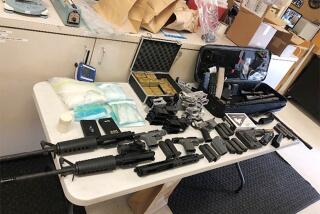Navy Probes Supply Thefts on Kitty Hawk
Federal agents are investigating the disappearance of more than $1 million in equipment and supplies from the San Diego-based aircraft carrier Kitty Hawk, including 31 bars of silver that vanished after the Navy supply system routinely filled bogus requisition orders for the precious metal, authorities said Thursday.
Seven of the silver ingots have been recovered, two of them in a drug raid last year in the city of Coronado adjacent to North Island Naval Air Station, where the 3,432-foot ship with its crew of 5,000 men is berthed, law enforcement sources said.
The Kitty Hawk inquiry, the latest in a series of probes into procurement scandals that have rocked the military, was disclosed at a congressional hearing Wednesday by Rep. Jim Bates (D-San Diego), who said that a Navy auditor had his life threatened after reporting “fraud, kickbacks and a variety of supply schemes.”
Pentagon and Navy officials subsequently confirmed that investigations are being conducted by the judge advocate general’s office and the Naval Investigative Service.
The sources identified the auditor as Petty Officer Robert Jackson, who told The Times in San Diego that in 21 months as an internal auditor on the Kitty Hawk, he documented widespread improprieties and questionable accounting and inventory methods.
Jackson said he found a “$200,000 impropriety” involving one contractor, whom he would not identify, as well as repeated instances in which the ship’s supply personnel “blatantly lied on inventory forms” to conceal the disappearance of $167,000 in equipment and supplies. He estimated that the $167,000 was about one-tenth of the total amount unaccounted for.
After he sought to bring the irregularities to the attention of higher-ranking officers, Jackson said, one of the ship’s bookkeepers “threatened to break me into little pieces and throw me into the screws of the ship.”
Jackson, 26, who has been in the Navy eight years, said he requested and received assignment to shore duty in June and that he plans to leave the Navy in September.
14-Digit Codes
According to documents made available by Bates, the 31 bars of silver valued at $16,588 were sent to the ship by the Navy supply system between June and September, 1983, after requisition orders were received from the Kitty Hawk. The orders used only 14-digit codes and did not specify what the item was or how it was to be used.
Navy officials said the nine-pound silver bars are melted and used to repair and maintain sophisticated electronic equipment but normally are sent only to tender ships, not aircraft carriers.
Sources said that two silver bars were recovered Jan. 11, 1984, when Coronado police and naval investigators raided a house as part of a narcotics investigation. Five bars had been found earlier aboard the Kitty Hawk, according to the sources, who said one enlisted man aboard the carrier confessed to selling the silver.
The sailor, who was not identified, is now subject to an Article 32 proceeding, roughly equivalent to an investigation by a civilian grand jury, but still is serving aboard the carrier, the sources said.
Navy Spokesman’s Statement
Asked about this, Lt. Cmdr. Thomas Jurkowsky, a Navy spokesman in San Diego, said the investigation concerning the silver bars “has been opened and closed numerous times as new suspects have been identified.”
Robert Teel, deputy regional director for the Naval Investigative Service, said the investigation has been closed and is now “in the hands of the judiciary . . . in terms of how it pertains to possible prosecution.”
Jurkowsky said the Navy did not become aware of the auditor’s information about irregularities in the Kitty Hawk’s supply system until less than a month ago, on June 14. But Jackson said he twice requested but was denied permission to see the Kitty Hawk’s captain.
Jackson said the ship’s supply officers showed little interest when he pointed out discrepancies between inventories he conducted and supplies that were supposed to be on hand. “I’d say: ‘Gentlemen, what you are doing is illegal.’ It was a big joke to them,” he said.
‘Half-Hearted’ Response
When he contacted the investigative service with his allegations, he said, the investigators responded “half-heartedly” and would not give him assurances that he would be reassigned off the ship before his role in the inquiry became known. For that reason, he said, he contacted Bates’ office on June 12. The congressman in turn contacted Pentagon officials, and Jackson was shifted to shore duty June 14.
“Threats were made to him that indicated he would be in particular danger if he accompanied the ship on its upcoming deployment,” Bates told a House Government Operations subcommittee hearing he called to receive testimony on procurement irregularities at Miramar Naval Air Station in San Diego.
Bates said Jackson, whom he described during the hearing only as “an informant,” had supplied “documentation . . . in exquisite detail” about possible fraud, kickbacks and other activities “that resulted in losses to the U.S. Navy that may run into the millions of dollars.”
In a later interview, Bates said that last year alone more than $1 million in equipment and supplies on the carrier were unaccounted for.
Missing Gyroscope
As an example, he cited a $31,380 gyroscope--a sophisticated device used in aircraft navigation--which an inventory form reported was missing. The document said that the “item was stowed incorrectly or material was relocated with the relocation paper work processed incorrectly, causing material to be ‘lost’ in the storeroom.”
Bates said identical wording was used on many other forms reporting the disappearance of expensive electronics gear.
Jackson, who turned stacks of documents over to Bates, said the missing items included sophisticated computer circuit cards and a host of aircraft parts. He described the carrier’s accounting system as “abominable.”
The ship’s supply and equipage fund had an $8-million budget, Jackson said, and he was able to substantiate that it had been overspent by $1.5 million.
When asked how the Kitty Hawk’s system compared with that of other ships, he laughed and looked down from the 25th-floor offices of his lawyer, Randy C. Whaley, at the carrier berthed across San Diego Bay.
“That ship over there is the best aircraft carrier on the West Coast,” he said. “Can you imagine what the worst one is like?”
Gaylord Shaw reported from Washington and David Freed reported from San Diego.
More to Read
Sign up for Essential California
The most important California stories and recommendations in your inbox every morning.
You may occasionally receive promotional content from the Los Angeles Times.










